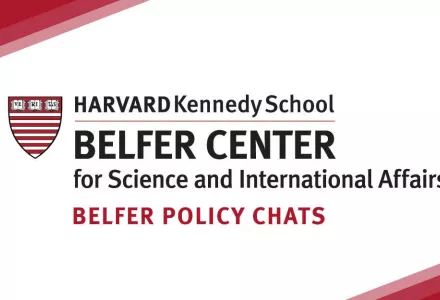You know the climate is changing. You may have marched, or struck with Greta--and you've definitely argued about it with family members over holiday dinners. But do you know how we know what we know about climate change, especially in remote regions? And do you have a sense of what you, as a future policymaker, will be able to do about it?
Focusing on the situation in the Arctic, Drs. Sarah Dewey and Sarah Mackie from our Arctic Initiative will be discussing aspects of climate change in the Arctic, from the production of knowledge to how it can feed into positive policy solutions. They will also share stories of their academic paths and answer your questions about turning research into a career.
Arctic Initiative |
The Belfer Center's Arctic Initiative seeks to develop new insights and collaborations that bring together science, technology, and policy to address the environmental, economic, and social challenges facing the Arctic. At the Arctic Initiative we are initiating new research; convening stakeholders like policymakers, scientists, and Arctic residents; and training a new generation of public and private experts to understand and address the factors driving change and risk in the region.
BPC Participants |
Aditi Kumar is Executive Director of the Belfer Center. Prior to coming to the Belfer Center, Kumar was a Principal at Oliver Wyman, a management consultancy, in the financial services and public policy practices. She worked primarily with U.S. commercial and investment banks as well as U.S. regulators and policymakers on designing and implementing financial and economic policy. Kumar previously served as a project manager at the World Economic Forum, responsible for leading policy discussions among financial sector executives and policymakers on managing financial risk and designing effective global financial regulation.
Kumar is a graduate of the Harvard Kennedy School and the Harvard Business School, where she studied international affairs, and specifically the nexus of national security and financial and economic policy. She previously worked at the International Affairs office of the U.S. Department of the Treasury, focused on assessing the public debt sustainability of Eastern European nations. She graduated from the Huntsman Program for International Studies and Business at the University of Pennsylvania with a Bachelor of Science in Economics and a Bachelor of Arts in International Studies.
Brittany Janis helping to lead the Arctic Initiative's research on developing policy solutions to combat plastic pollution in the Arctic Ocean. She graduated in May of 2019 from the Harvard Kennedy School MC/MPA Program. While a student at HKS, Brittany worked as a Research Assistant for the Arctic Initiative, was a student member of the HKS Sustainability Leadership Council, and served as Program Director for the student-led Social Enterprise Conference.
Before coming to Harvard, she spent her career working in strategic fund development and nonprofit management for a range of nonprofit organizations from New York to San Francisco. Most recently, she served as a Major Gift Officer at Environmental Defense Fund (EDF). She’s a former President of the Association of Fundraising Professionals Golden Gate Chapter. She is a Certified Fundraising Executive (CFRE) and holds a M.A. in Philanthropy and Development from St. Mary's University of Minnesota. She received her B.A. in History, Political Science, and Theater from Case Western Reserve University.
Sarah Dewey is a postdoctoral research fellow with the Belfer Center’s Arctic Initiative. She holds a PhD and MS in Oceanography from the University of Washington and a BS in Geology & Geophysics from Yale University, and her field experience centers on the use of aerial platforms to observe the western Arctic Ocean.
Dr. Dewey’s current research quantifies time and space scales of ice-ocean interaction and links them to the scope of environmental policy, strategic response, and mitigation of marine pollution. Besides her passion for fieldwork, a background in journalism and environmental education has fed Dr. Dewey’s interest in science education, outreach, and the connection between geophysical research and policy.
Sarah Mackie is a postdoctoral research fellow at the Belfer Center’s Arctic Initiative. She holds a law degree from the University of Cambridge and an LLM in environmental law from Newcastle University. A qualified lawyer in England and Wales, she has worked as a Judicial Assistant for the Lord Chief Justice of England and Wales.
Dr. Mackie recently completed a PhD on comparative environmental law in the Arctic, with a particular focus on endangered species protection across Arctic jurisdictions. This research was conducted at a number of Arctic and other institutions including Newcastle University, Harvard Law School, Ilisimatusarfik (Greenland), the Arctic Centre (University of Lapland, Finland) and the KG Jebsen Centre for the Law of the Sea (University of Tromso, Norway).
Dr. Mackie has published a number of journal articles, including in the Harvard Environmental Law Review; authored a chapter of a book on environmental security in the Arctic Barents Region; and has presented at the Arctic Circle Assembly (Iceland) and at the Polar Law Symposium (Finland and Norway). Her current research explores issues of endangered species protection law in the Arctic nations and the Arctic Ocean.

